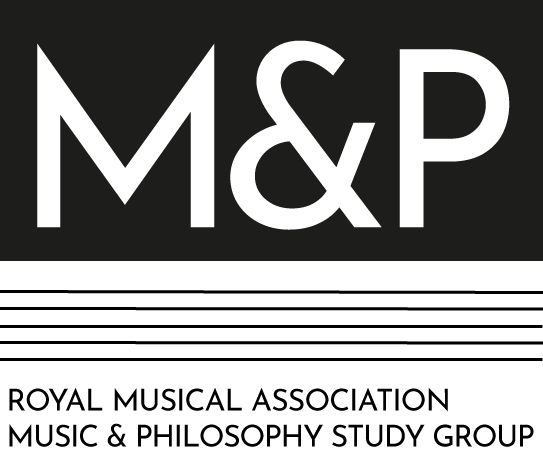This symposium took place at King’s College London on the 10th Nov 2010. Three speakers — Peter Kivy, Ian Cross, and Max Paddison — provided three very different answers to the question ‘What can science tell us about musical meaning?’ The below report was written by Mats Küssner and Michael Migliore. It was published in the April 2011 issue of the Newsletter of the Royal Musical Association.
What can science tell us about musical meaning?
A Royal Musical Association Music and Philosophy Study Group Symposium
Generously supported by the British Society of Aesthetics
King’s College London, Wednesday 10th November 2010
The first event of the newly established RMA Music and Philosophy Study Group was held at King’s College London on 10 November 2010 and was attended by around 100 interested people, all very keen to know ‘what science can tell us about musical meaning’. After a brief introduction by chair Julian Dodd, Peter Kivy (Rutgers University) gave a 50-minute lecture followed by shorter papers from Ian Cross (University of Cambridge) and Max Paddison (Durham University), before a general discussion drew the symposium to a close.
Kivy began his address with the observation that the number of psychological experiments on music – especially those concerned with music and emotion – had increased considerably over the past few years, and, in the same breath, expressed his great doubt that absolute music is an appropriate object for such endeavors. His claim that scientific experiments cannot contribute to explaining musical meaning was subsequently, and for the remainder of his talk, explicated with the help of Aniruddh Patel’s book Music, Language and the Brain (2007), in which Patel, a neuroscientist, compares studies of meaning in language and music. Kivy argued that Patel’s definition of the word meaning is initially changed to fit the study’s experimental paradigm in the sense that his definition is ‘stipulative’, as opposed to ‘propositional’, and that he misleads his readers by appropriating his findings in the conclusion to the definition of meaning in the broader, propositional sense. Although using many more or less well-selected examples by way of analogy to strengthen his argument, one got the impression that Kivy was more interested in solidifying disciplinary boundaries (‘experiments tell us what we already know’) rather than exploring the question at hand. For Kivy, musicologists are (clearly) the only ones who have any legitimate claims to speaking about music.
Resisting following Kivy into the depths of the Oxford English Dictionary in the search for meaning, Cross started off by stating what sciences are (not monolithic, but co-equal; commensurable) and should be (lawful; accurate; generalisable and predictive) before acknowledging that they cannot tell us anything much about musical meaning as far as its referential/aesthetic category is concerned. However, if music is situated in broader, trans-cultural and trans-historical understandings, the sciences may well be in the position to contribute to our understanding of musical meaning with regards to several aspects of music operating on social, behavioural, perceptual/expressive, and neuroscientific levels. With this move, Cross also freed music from the Western concert hall (where Kivy had left it behind) and put it in a wider anthropological context: music is at root a communicative medium, it is interactive, participatory and has a profound social efficacy. Drawing on Tomasello’s concept of ‘shared intentionality’, he continually stressed music’s communicative function, especially when it comes to pragmatics. For Cross, music and language are homologous, both being manifestations of an underlying human communicative capacity, culturally diverse but grounded in common propensities. Cross delivered a cohesive and convincing paper, although large parts of the audience may have hoped that the Director of the Centre for Music and Science at Cambridge would have focused more on the ‘hard’ sciences instead of presenting an ethnomusicological discourse.
Paddison began by exploring ‘science’ in terms of its propositional nature, as knowledge requiring the collection of ‘facts’ that can be categorized under general laws in order to validate ‘truths’. From the outset, Paddison made clear that the type of knowledge and understanding required of science are irreconcilable with Art whether as concept, activity, or experience. With this, Paddison was the first speaker to touch on the contingency of ‘meaning’ and ‘science’ as concepts, though all three speakers failed to specify what the vague ‘musical’ might mean. As he explored the ‘contentious’ issue of musical meaning, Paddison explained the inevitable role ideology plays in both the scientific method and its mediation of the ultimate universal, nature, on the one hand, and the non-cumulative methods of Art criticism, on the other. He did acknowledge that there are approaches in musicology that aspire to the status of the natural sciences, but throughout his lecture focused on the differences between modes of enquiry in the sciences and those in the humanities. Paddison relied on the Adornian conception of musical material; by consistently redefining itself Art resists analysis; its ambiguity resists the analyst’s betrayal. Paddison suggested that the appeal to universals particular to a scientific approach cannot account for Art’s aberrant ontological status. This status, however, is a challenge, and one that can only be ‘answered’ by the modes of enquiry based on the collection of knowledge particular to the humanities.
Both Paddison and Kivy, for different reasons, suggested that science cannot contribute positively to an exploration of musical meaning, while Cross did an admirable job of exploring some ways the relationship between the two might yield various results. Although disciplinary borders and problems between divergent and convergent modes of understanding might pose significant barriers in advancing this matter, overall one is tempted to suggest that ‘what science can tell us about musical meaning’ is simply an underexplored and problematic topic.
Even a lively post-symposium discussion over dinner with all three speakers and a handful of (still) eagerly inquisitive attendees could not provide a satisfying answer, which is why we look forward to the next RMA Music and Philosophy Study Group event and further stimulating debates.
Mats Küssner and Michael Migliore, Department of Music, King’s College London
